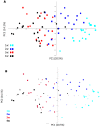Age Rather Than Supplementation with Oat β-Glucan Influences Development of the Intestinal Microbiota and SCFA Concentrations in Suckling Piglets
- PMID: 37106912
- PMCID: PMC10135274
- DOI: 10.3390/ani13081349
Age Rather Than Supplementation with Oat β-Glucan Influences Development of the Intestinal Microbiota and SCFA Concentrations in Suckling Piglets
Abstract
The effects of early supplementation with oat β-glucan during the suckling period on piglet gut microbiota composition, concentrations of short-chain fatty acids, and gut physiological markers were assessed. Fifty piglets from five litters, balanced for sex and birth weight, were divided within litters into two treatment groups: β-glucan and control. Piglets in the β-glucan group received the supplement three times/week from day 7 of age until weaning. Rectal swab samples were collected from 10 piglets per treatment group (balanced across litters) from week 1 to week 4, and plasma samples were collected at 1, 3, and 4 weeks of age. Additional samples of intestinal tissues and jugular and portal vein plasma were collected from 10 animals at weaning (one per treatment group and litter). The concentrations of short-chain fatty acids in plasma and the microbiota composition in rectal swabs were mainly influenced by piglet age, rather than the supplement. There were significant differences in microbiota composition between litters and several correlations between concentrations of short-chain fatty acids in plasma and specific microbial taxa in rectal swabs. Overall, β-glucan supplementation did not have any clear impact on the gut environment in suckling piglets, whereas a clear age-related pattern emerged.
Keywords: SCFA; microbiota; suckling piglets; β-glucan.
Conflict of interest statement
The authors declare no conflict of interest.
Figures





References
Grants and funding
LinkOut - more resources
Full Text Sources

